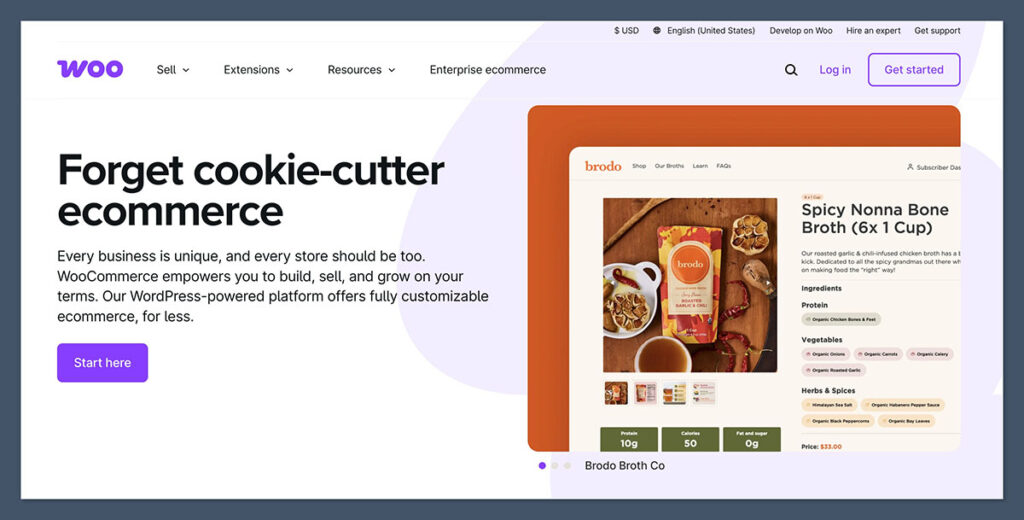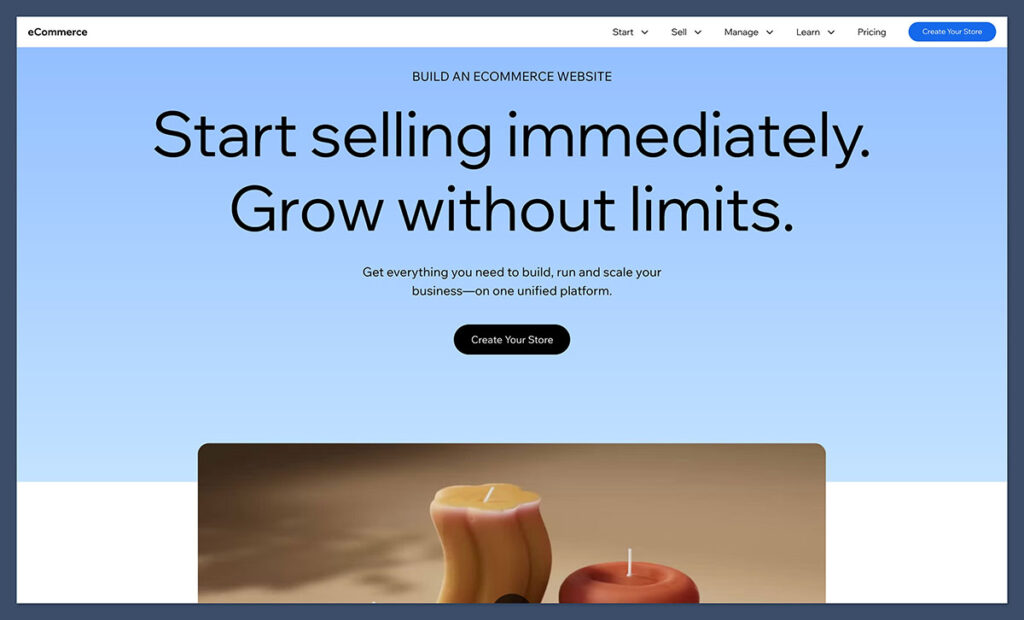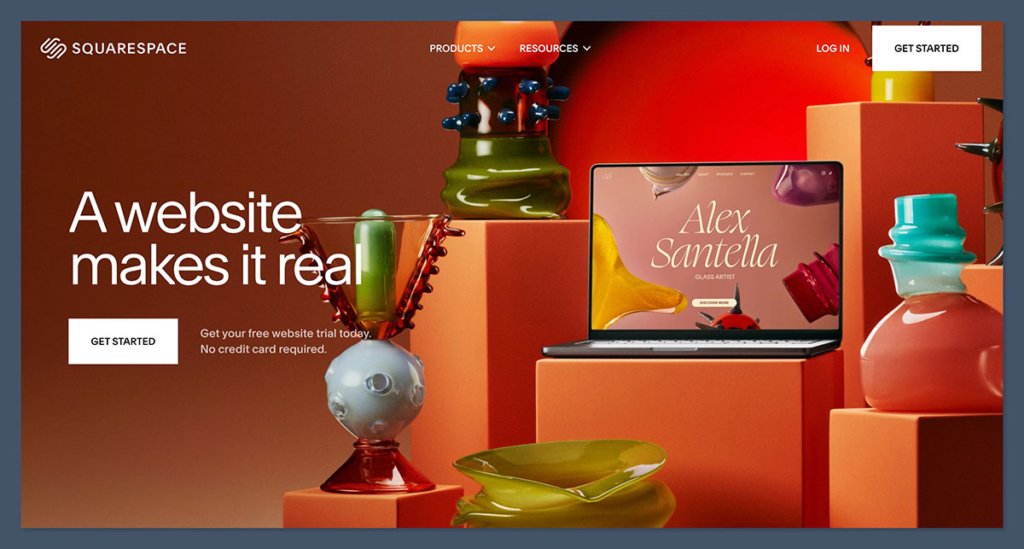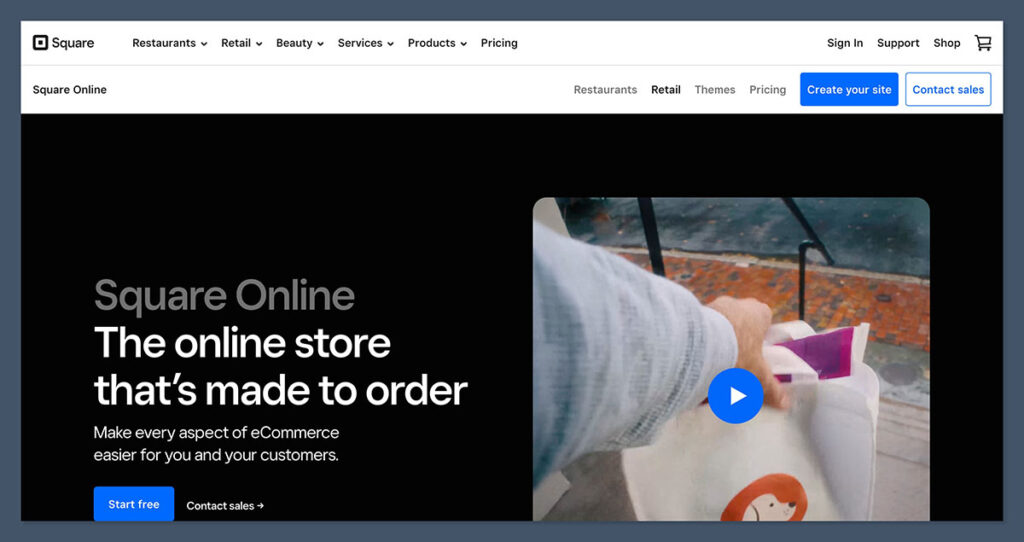Best Ecommerce Platforms for Dropshipping
After testing the most popular ecommerce platforms, I’ve narrowed it down to the best seven for starting and scaling a dropshipping business. Whether you're looking for fast setup, supplier integrations, or tools to help you automate fulfillment, there’s a platform here that can fit your needs.
Shopify came out on top overall for its built-in dropshipping features and massive app ecosystem, while WooCommerce impressed with its flexibility and control. I’ve also included strong options for beginners, design-focused brands, and sellers who operate both online and in person.
Our Top 3 Dropshipping Platforms:
- Shopify – Best overall for speed, automation, and scaling
- WooCommerce – Best for flexibility and full control
- BigCommerce – Best for large catalogs and built-in features
Best Ecommerce Platforms for Dropshipping – Quick Comparison
| Platform | Rating | Price From | Free Plan/Trial | Best For |
|---|---|---|---|---|
| Shopify | ⭐ 4.8 | $29/month | 3-day free trial | Fast setup, automation, scaling |
| WooCommerce | ⭐ 4.6 | Free (plus hosting) | No trial | Full control, advanced custom stores |
| BigCommerce | ⭐ 4.5 | $39/month | 15-day trial | Large catalogs, built-in features |
| Wix | ⭐ 4.3 | $16/month | Free plan | Beginners, drag-and-drop setup |
| Squarespace | ⭐ 4.2 | $16/month | 14-day trial | POD and brand-first storefronts |
| Square Online | ⭐ 4.0 | Free or $12/month | Free plan | In-person + online selling (POD) |
| Shift4Shop | ⭐ 3.8 | Free (US only) | Free plan (with Shift4 Payments) | Budget-conscious US sellers |
Key Takeaways
- Shopify offers the strongest all-around solution for dropshippers who need speed, automation, and room to scale.
- WooCommerce is best for experienced users who want to control every detail of their store, from design to checkout.
- BigCommerce is built for serious sellers managing larger product catalogs, with strong native ecommerce features.
- Wix is a solid choice for beginners who want an easy way to launch a store and start selling with built-in tools.
- Squarespace is ideal for visually-led brands, POD sellers, and anyone looking to build a clean, polished storefront.
- Square Online works well for small businesses combining online and in-person sales through one simple platform.
- Shift4Shop gives US sellers a cost-saving option with a surprisingly robust ecommerce feature set—just read the fine print.
1. Shopify – The Best Platform for Selling and Automation

Starting from: $29/month
Free trial: 3 days, then $1/month for the first 3 months
Dropshipping support: DSers, Printify, Spocket, Zendrop
⭐ Rating: 4.8 out of 5
Shopify is the dominant player in the dropshipping space in 2026, and for good reason.
This platform is built from the ground up for ecommerce, and it's got the most extensive library of apps for automating supplier connections, order fulfillment, and all the rest. If you want to go from zero to testing products in under a day, Shopify is the way to go.
Don't worry if you're not super tech-savvy – launching a pro-looking store is a breeze.
Shopify's onboarding process walks you through theme selection, product setup, payments, and shipping, so you can get started quickly.
And once you're up and running, adding suppliers through DSers or Printify is just a few clicks away. The interface is clean and easy to use, and scaling through apps like ReConvert and Klaviyo is a piece of cake.
Why Shopify Is Great
- Fast setup and product testing
- Tons of app options for dropshipping
- Built-in analytics and marketing tools
- Reliable performance and security
Why Shopify Isn't Perfect
- Extra costs from third-party apps
- Limited design freedom unless you know Liquid
What Makes Shopify Stand Out
- DSers integration for automated AliExpress sourcing and bulk ordering
- Shopify Sidekick, a new AI tool for generating product descriptions and managing store tasks
- One-click app installs for supplier networks, reviews, upsells, email, and SMS tools
- Shopify Markets for selling internationally with localized checkout
Pricing
| Plan Name | Price (USD) | Best For |
| Basic | $29/month | New dropshipping stores |
| Shopify | $79/month | Growing businesses |
| Advanced | $299/month | High-volume scaling |
| Shopify Plus | From $2,000/month | Enterprise-level operations |
All plans come with unlimited products, abandoned cart recovery, and access to the full app marketplace.
The main difference is in the reporting, staff accounts, and lower transaction fees. You can accept payments via Shopify Payments or external gateways (which may add extra fees). The $79/month plan is a good balance between cost and features when you start to grow.
Who Shopify Is Best For
Shopify is ideal for sellers who want to focus on testing products, running ads, and scaling fast – without getting bogged down in tech. It's great for dropshippers working with AliExpress, POD apps, or curated supplier networks. If you value automation and speed, this is your best option.
2. WooCommerce – The Best For Customization and Flexibility

Starting from: Free plugin (hosting and other costs apply)
Dropshipping support: ALD, WooDropship, Printful, Spocket
⭐ Rating: 4.6 out of 5
WooCommerce is a free plugin that turns any WordPress site into a flexible online store. It's not the easiest platform to set up, but it gives you complete control over everything – hosting, performance, checkout flows, and theme design.
For developers, marketers, or SEO-driven stores, WooCommerce is the way to go.
You can pair it with a range of dropshipping plugins, depending on your fulfillment model. Whether you want to import AliExpress products using ALD, connect US suppliers through Spocket, or run a full print-on-demand shop via Printful, WooCommerce can handle it.
Why WooCommerce Is Great
- Free to start and open source
- Full SEO control and site customization
- Huge plugin ecosystem
- Can be hosted anywhere, offering more control over cost and performance
Where WooCommerce Falls Short
- Can be a bit of a tech challenge to set up
- You're going to be responsible for sorting out hosting, updates and backups – which can be a right pain in the neck
- Plugins can potentially conflict with each other or slow the site down
Notable Features
- ALD Dropshipping plugin for automating AliExpress – it's a real game-changer
- Deep integrations with Printful and Spocket to make dropshipping a doddle
- Loads of flexible payment gateways, including Stripe, PayPal, crypto and all the usual suspects
- Yoast SEO and Rank Math to give you full control over on-page SEO
Pricing
| Cost Type | Estimated Range |
| Hosting | $5–$30/month |
| Domain + SSL | $10–$50/year |
| Paid Plugins | $29–$200/year |
| WooCommerce Core | Free |
WooCommerce itself is free, but don't forget you'll need to splash out on some decent hosting, a domain and an SSL certificate if you want to get serious about dropshipping. Realistically, you're looking at about $100 to $300 per year to keep your store fully functional and up to date.
Best For
WooCommerce is ideal for anyone who wants the flexibility to do their own thing and is comfortable working with code or tweaking the underlying tech. It's a great choice for anyone who wants full control and is willing to get their hands dirty.
3. BigCommerce – Best for Stores That Need To Scale

Starting from: $39/month – pretty standard ecommerce pricing
Dropshipping support: Spocket, Syncee, AliExpress – all the usual suspects
⭐ Overall Rating: 4.5/5 – BigCommerce really is that good
BigCommerce stands out from the pack because it comes with loads of enterprise-grade features right out of the box. No need to install a dozen apps to get the core functionality. You get features like real-time shipping rates, abandoned cart saver and built-in SEO as standard.
It's the perfect choice for dropshipping businesses with a large product catalog or multiple storefronts. BigCommerce also supports headless commerce, so you can use your own frontend while keeping their backend doing all the heavy lifting.
Pros
- Loads of built-in enterprise-grade features to keep you ahead of the game
- Great inventory management tools to keep your products in check
- No transaction fees on any plan – a major bonus
- Seamless omnichannel integration with the likes of Amazon, eBay and Walmart
Cons
- Their app store isn't as big as Shopify's
- The interface can feel a bit technical and less than intuitive
Notable Features
- Built-in real-time shipping from carriers like FedEx and UPS – just like having your own personal shipping department
- Product filtering, variants and bulk tools to make life easier
- Custom B2B pricing tiers and quote management for when you need to get fancy
- Multi-storefront management from one admin panel – one click and you're done
Pricing
| Plan Name | Price (USD) | Sales Limit Per Year |
| Standard | $39/month | Up to $50K |
| Plus | $105/month | Up to $180K |
| Pro | $399/month | Up to $400K |
| Enterprise | Custom pricing | Over $400K |
All plans give you unlimited products, no transaction fees and access to killer features like multi-channel selling, customer groups and mobile optimisation. Just be aware that as your revenue grows, you'll be bumped into higher tiers – which is probably a good thing.
Best For
BigCommerce is perfect for serious dropshippers who want a stable, backend-first platform that can grow with them. It's a great choice for stores with large catalogs, multiple regions or B2B pricing requirements. If you're scaling up and want fewer external apps to manage, BigCommerce delivers all the goods.
4. Wix – Best for Newbies

Starting from: $16/month – a pretty sweet price point
Dropshipping support: Modalyst, Printful, Printify – all the usual suspects
⭐ Overall Rating: 4.3/5 – Wix is a solid choice
Wix makes it easy to launch your first dropshipping store with their drag-and-drop editor and thousands of templates. It's a no-brainer for beginners who don't want to get bogged down in code or technical jargon.
Modalyst is integrated directly into Wix's dashboard, so you can import products in a snap. Wix also gives you AI-powered tools to help build your store, write content and create marketing automations.
Just be aware that Wix is best suited for smaller catalogs. As your product count or order volume increases, you may find their backend starts to get a bit wobbly.
Pros
- Simple drag-and-drop editor that makes it easy to create your store
- Loads of features to help you build and grow your business* Built-in Modalyst integration is a game-changer – saving time and effort
- Templates and designs are a breeze to customize to your liking
- AI tools make generating site content and product sections a walk in the park
Cons
- To be honest, you can't beat the ease of Wix compared to some of these other providers
- Limited integrations for advanced logistics or automations – not perfect for every business model
Notable Features
- The Wix Owner App is a lifesaver for managing orders and products from your phone on the go
- Wix Automations is a great tool for email workflows and reminders – taking a lot of the heavy lifting off your plate
- Integrated email marketing and SEO settings make a huge difference in getting your site seen
- And let's not forget about Wix's 2000+ templates – all designed with online selling in mind
Pricing
| Plan Name | Price (USD) | Key Features |
| Business Basic | $16/month | Accept payments, basic ecommerce tools |
| Business Unlimited | $27/month | Subscriptions, multiple currencies |
| Business VIP | $35/month | Priority support, advanced reporting |
All Wix ecommerce plans let you accept payments and sell products online.
Business Unlimited is the most popular option for dropshipping, as it gives you currency conversion, product subscriptions and some storage boosts. Be aware that extra apps like email marketing may come with added costs.
Best For
Wix is for beginners who don't want to overcomplicate things with a fancy ecommerce platform. It's especially a great fit for creatives, solopreneurs, or hobby sellers who value ease of use and visual customization over deep technical features.
5. Squarespace – Best for Design and POD Brands

Starting from: $16/month. Honestly though, the starting price might feel a bit steep for some. But trust us, it’s worth it
Dropshipping support: With Squarespace, you can connect with Printful, and Spocket via the Extensions Marketplace – making it super easy to get started with dropshipping
⭐ Overall Rating: 4.2 out of 5 – a solid choice for a lot of sellers
Squarespace is a standout pick for creators and brand-focused sellers who want to make a visual statement with their store without needing to be a design expert. The templates are sleek, modern and mobile-friendly – perfect for product types where presentation really is everything – like fashion, art, homeware, or any print-on-demand brand.
When it comes to dropshipping support, Squarespace integrates directly with Printful and Spocket in the Extensions Marketplace.
Adding products, customizing your catalog and fulfilling orders is all done seamlessly without having to leave the Squarespace environment.
Keep in mind though that while Squarespace is great, it’s not as packed with features as some other platforms like Shopify or WooCommerce. It works best for smaller product lines where visual branding is more important than having a ton of fancy automation or backend features.
Pros:
- The templates on Squarespace are seriously stunning – you can make your store truly pop
- You get built-in email marketing and SEO tools to make sure your site is seen
- Easy integration with POD apps makes it a no-brainer for print-on-demand sellers
- The editor is beginner-friendly – making it perfect for new sellers
Cons:
- The only downside is that there’s no free plan – though we promise it’s worth the investment
- The third-party app support is limited – so if you’re looking for a ton of customization options, this might not be the best choice
Notable Features:
- You can add Printful and Spocket as Squarespace Extensions – making it super easy to get started with dropshipping
- Mobile-optimized layouts and animations – so your site looks great on any device
- Email automation and customer segments – because who doesn’t love a well-run marketing campaign?
- And don’t even get me started on the AI site builder – Blueprint is a game-changer
Pricing
| Plan Name | Price (USD) | Key Features |
| Business | $23/month | Sell unlimited products, basic analytics |
| Commerce Basic | $27/month | No transaction fees, product reviews |
| Commerce Advanced | $49/month | Abandoned cart recovery, subscriptions |
Squarespace’s Business plan lets you sell online but hits you with a 3% transaction fee.
The Commerce Basic plan removes that fee and adds ecommerce-specific features like checkout customization and customer accounts. If you plan on running email campaigns, offering subscriptions or recovering abandoned carts, the Commerce Advanced tier is the way to go.
Best For
Squarespace is perfect for brands that live and breathe visual storytelling – like POD sellers, boutiques, artists or designers.
If you want a site that screams your brand and don’t need all the fancy backend features, Squarespace will give you the tools to create a beautiful, on-brand experience with minimal fuss.
And let’s be real, if you’re planning to use Printful for apparel and custom merch or Spocket for US/EU supplier catalogs, this platform makes total sense. It’s especially great for sellers who care more about how their brand looks and feels than managing complex logistics.
6. Square Online – Best for Omnichannel Selling

Starting from: You can actually get started with a free plan – which is awesome
Dropshipping support: With Square Online, you can connect directly with Printful – making it a great choice for small POD brands
⭐ Overall Rating: 4.0 out of 5 – a solid choice for sellers who need a little something extra
Square Online is built for small businesses that sell both online and in person.
Powered by the same system behind Square’s point-of-sale tools, this platform is perfect for merchants who do local selling at markets, pop-ups, or shops – but still want to take online orders without the hassle of a ton of technical setup.
When it comes to dropshipping, Square Online integrates directly with Printful, making it a great fit for small POD brands that sell custom products at events or via their website. You can sync your product catalog, manage inventory and handle customer orders all from one place.
The editor is straightforward, but keep in mind that it’s not the most flexible when it comes to design – so if you need a lot of customization options, you might want to look elsewhere. It’s not built for scaling large product catalogs or advanced automations, but for smaller, hybrid businesses, it hits the spot perfectly.
Pros:
- You can get started with a free plan – no risk at all
- Syncing online and in-person inventory is a breeze – perfect for sellers who do both
- Built-in POS and payment tools – because who doesn’t love easy checkout?
- Great for events and pop-up shops – if you have a seasonal business, this is a great choice
Cons:
- Limited app ecosystem
- Not suited for global supplier networks
Pricing
| Plan Name | Price (USD) | Key Features |
| Free Plan | $0/month | Basic website with Square branding |
| Professional | $12/month | Custom domain, no ads |
| Performance | $26/month | Accept payments, cart recovery, PayPal |
| Premium | $72/month | Advanced analytics, shipping rate discounts |
Square Online’s All Plans are free, which is pretty awesome. The Basic plan lets you sell up to $50,000 per year without transaction fees.
The Plus and Pro plans are a bit more expensive, but open up more features and higher sales limits.
Notable Features:
- Printful integration for apparel and home goods. This is a great way to get started selling print-on-demand products
- Built-in email campaigns and marketing – super helpful for getting the word out about new products and promotions
- Real-time inventory sync with Square POS – This will save you a ton of headaches at tax time
- Mobile app for store management – lets you stay on top of orders and customer service from anywhere
Best For
Square Online is perfect for sellers who need a little something extra – like a platform that lets you sell both online and in person.
If you’re a small business owner who’s always on the go, Square Online gives you the tools to manage sales, inventory and customer orders all in one place.
It’s especially great for sellers who use Printful for their online dropshipping business – this platform makes it super easy to get started and manage your products.* Limited app ecosystem, to put it bluntly – just doesn't have as many third party integrations as some other ecommerce platforms.
7. Shift4Shop – Best for No Monthly Fees (US Only)

Starting from: Free (with Shift4 Payments)
Dropshipping support: Spocket, Printful, custom integrations
⭐ Overall Rating: 3.8 out of 5
Shift4Shop is a bit of an oddball. On the one hand, it claims to be a completely free ecommerce platform – but only if you use Shift4 as your payment processor and are based in the US.
The tradeoff is that you get access to some seriously premium features that would normally cost anywhere from $30 to $100 per month elsewhere – like built-in abandoned cart tools and unlimited product listings. For cash-strapped dropshippers or sellers just testing the waters, this can be a real lifesaver.
Just keep in mind that Shift4Shop's backend interface feels a bit dated and their support ecosystem is a bit smaller. Also, be sure to double-check your eligibility – since the “free” plan is tied to Shift4's merchant services.
Pros:
- No monthly fee if you meet the eligibility requirements
- Has some solid built-in SEO and ecommerce tools
- Unlimited product listings – which is a big plus if you're selling a lot of different products
- Includes hosting and SSL – so you don't have to worry about any of that tech stuff
Cons:
- Only available to US sellers – so if you're outside the US, you're out of luck
- The user interface is a bit clunky compared to some of the other platforms out there
Notable Features:
- Built-in dropshipping tools
- Some free themes and responsive templates to get you started
- Abandoned cart recovery and CRM features
- No transaction fees
Pricing
| Plan Type | Price (USD) | Conditions |
| End-to-End Plan | $0/month | Requires Shift4 Payments (US only) |
| Paid Plans | From $29/month | Available if not using Shift4 Payments |
If you're eligible, the End-to-End Plan is basically the same as the paid plan – except you don't pay a monthly fee. Just be aware that you'll still have to pay transaction fees via Shift4.
If you're outside the US or don't meet the eligibility requirements, you'll have to move to a paid plan, which starts at $29/month
Best For
Shift4Shop is best for US-based sellers who want to avoid monthly SaaS fees. If you're just starting out with dropshipping and want to keep your operating costs as low as possible, this is definitely worth looking into
It supports Printful and Spocket, and you can get a basic dropshipping store up and running with some robust ecommerce features without having to install a ton of extra tools. It's not the most modern or design-friendly option – but for budget-conscious sellers it delivers some serious value
What to Look for in an Ecommerce Platform for Dropshipping?
Before choosing a platform, it’s worth knowing what actually matters for dropshipping. Not all ecommerce builders are created equal—especially when it comes to automating fulfillment, managing suppliers, or scaling beyond the first few sales.
Here are the key features I focused on while comparing each platform:
1. Dropshipping App Integrations
The platform should work seamlessly with popular dropshipping apps like DSers, Spocket, Printful, Zendrop, or Modalyst. These tools handle product importing, supplier sync, and order fulfillment. Some platforms (like Shopify) have dozens of options. Others (like Squarespace) are more limited.
2. Ease of Use
Your platform should make it simple to set up a store, import products, and fulfill orders—even if you’ve never built a website before. Platforms like Wix and Shopify shine here, while tools like WooCommerce offer more power at the cost of simplicity.
3. Scalability
If you plan to grow (more SKUs, more orders, more marketing), your platform needs to grow with you. That means supporting:
- Multi-channel selling (e.g. Amazon, TikTok, eBay)
- High-traffic performance
- Automation tools (abandoned carts, upsells, email flows)
4. Total Cost
Look beyond the base monthly fee. Factor in:
- Transaction fees (especially if you’re not using the native payment processor)
- App/plugin costs
- Theme or template upgrades
- Email and marketing tools
Platforms like Shift4Shop look free on the surface, but they come with limitations or tie-ins that could cost more long term.
5. Supplier Type Support
Not all platforms work equally well across dropshipping models:
- AliExpress: DSers (Shopify), ALD (WooCommerce)
- US/EU suppliers: Spocket, Syncee
- POD: Printful, Printify, Gooten
- Wholesale/B2B: Modalyst Pro, custom supplier integrations
Make sure the platform supports your fulfillment model out of the box—or at least with apps.
How We Tested the Platforms
To make this list genuinely helpful, I didn’t just research feature lists or pricing pages. I tested each platform hands-on, building real stores and running product workflows to evaluate how each one handles the day-to-day needs of a dropshipping business.
Here’s how the testing process worked:
1. Setup and Store Creation
I started by creating a store on each platform—either from scratch or with a demo template. I looked at how quickly I could:
- Pick a theme or template
- Add branding (logo, color, layout)
- Set up product pages and categories
- Connect a domain and payment provider
2. Dropshipping Integration Testing
Next, I connected the most popular dropshipping apps supported by each platform. For example:
- Shopify: DSers, Spocket, Printful
- WooCommerce: ALD, Printful plugin
- Wix: Modalyst
- Squarespace: Spocket and Printful Extensions
I tested how easy it was to import products, customize product pages, fulfill orders, and manage variants.
3. Performance and Features
I assessed built-in features like:
- Inventory tracking
- Abandoned cart recovery
- SEO tools
- Analytics dashboards
- Shipping rate setups
Platforms that required too many third-party tools to function got marked down, especially if those tools added extra monthly fees.
4. Cost Breakdown
I calculated what it would cost to run each platform with the essentials:
- Entry-level plan
- One dropshipping app
- Basic email or automation tools
- Payment processing
This helped surface hidden costs—like high transaction fees or required app upgrades.
5. Support and Help Center
I evaluated each platform’s:
- Onboarding experience
- Help documentation
- Support speed and accuracy
- Community and third-party support (e.g., forums, YouTube, Reddit)
Shopify and Wix were the easiest to get started with. WooCommerce offered the most flexibility but required more problem-solving.
Final Takeaways: Which Dropshipping Platform Should You Choose?
Honestly, there's no single best ecommerce platform for everyone – it really depends on your experience, product model, growth plans, and how much control you want. Here's a quick summary:
| Platform | Best For |
| Shopify | Sellers who want fast setup, automation, and scale |
| WooCommerce | Developers and marketers who want full control |
| BigCommerce | Stores with large catalogs and backend needs |
| Wix | Beginners looking for a simple, guided setup |
| Squarespace | POD brands and creators focused on branding |
| Square Online | Omnichannel sellers combining online and retail |
| Shift4Shop | Budget-conscious US sellers avoiding monthly fees |
If you're just starting out and want the simplest route to testing the waters and getting going, Shopify is likely your safest bet. It's got the most comprehensive set of tools for building and expanding, plus it's got a pretty slick system for automating things and managing suppliers.
If you're looking for a bit more control and don't mind handling the behind the scenes stuff for your own site, WooCommerce is probably your best bet – it's the most flexible option and still pretty budget-friendly.
But let's be honest, for the folks who care most about building a strong brand, Squarespace is a tough act to follow when it comes to design.
And if you're planning to sell some stuff in person, as well as online, then Square Online makes the transition a whole lot smoother.
Try the free plans, test integrations, and choose based on your fulfillment model and how you plan to grow.




Comments 0 Responses